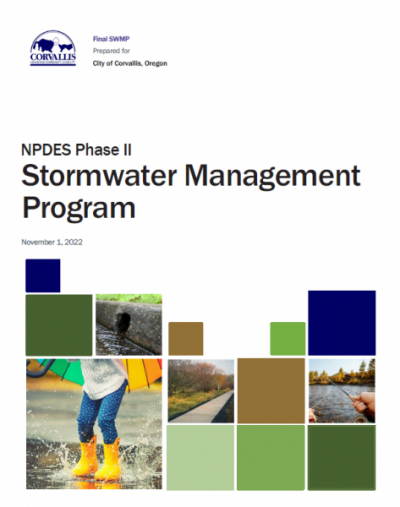Stormwater Management Program (SWMP)
The City of Corvallis recognizes that reducing stormwater pollution is essential to the quality of life for our citizens and our environment. The National Pollution Discharge Elimination System (NPDES) Municipal Separate Storm Sewer System (MS4) permit issued by the Oregon Department of Environmental Quality (ODEQ) establishes conditions, prohibitions, and management practices applicable to discharges of stormwater from permit registrants like the City of Corvallis.
The City is dedicated to continued implementation of the Stormwater Management Program (SWMP), in compliance with current ODEQ stormwater permit requirements, in order to protect water quality. The 2022 SWMP describes activities related to implementation of the City’s NPDES MS4 Permit. The SWMP contains a number of best management practices (BMPs), which outline the specific tasks that the City will conduct to satisfy the requirements of the NPDES MS4 Permit and the Clean Water Act (CWA).
This 2022 version of the City’s SWMP was developed based on a review and evaluation of the City’s existing stormwater management program, including activities and accomplishments implemented during the previous permit term and during the administrative extension period. The City has used an adaptive management process to assess and modify, if necessary, BMPs to achieve reductions in stormwater pollutants and meet permit requirements. This SWMP update considers available technologies and practices, review of SWMP measurable goals and tracking measures, and evaluation of City resources available to implement programs.
The SWMP plan includes six elements, termed "stormwater management control measures," required by the EPA as part of the Phase II program and a brief summary is included below:
Section 1: Public Education and Outreach
Public education and outreach is an integral component of a successful stormwater pollution prevention program. Increasing public knowledge on local water quality issues is key to obtaining public support and ownership for stormwater programs. This stormwater control measure includes pollution prevention program for schools, residences, and businesses. It also includes education and outreach to public officials, translation of stormwater program materials for non-English speakers, a pet waste cleanup program and an erosion and sediment control education program.
Section 2: Public Participation/Involvement
The public provides valuable input and assistance to the City's stormwater pollution prevention program. The goal of the public involvement and participation program will be to effectively involve a diverse cross-section of people who can participate in stormwater pollution prevention activities. The public involvement efforts will be closely tied with the public education and outreach efforts that form another component of Corvallis' stormwater program.
The public participation/involvement control measure includes periodic updates of the City of Corvallis webpages related to stormwater, stewardship opportunities like stream cleanups, storm drain marking, stream steward program, and periodic media releases about pollution prevention and other stormwater topics.
Section 3: Illicit Discharge Detection and Elimination
The goal of the Illicit Discharge Detection and Elimination (IDDE) stormwater control measure is to detect and eliminate illegal discharges and illicit connections to the storm drain system. The City accomplishes this through the following programs: MS4 mapping, ordinance requirements, enforcement procedures, an IDDE program, a dry weather screening program, and through training and education.
BMPs include an IDDE hotline, enforcement and ordinance revisions, database tracking, dry weather outfall surveys, as staff training.
Section 4: Construction Site Runoff Control
The goal of the construction site runoff control program is to prevent sediment from leaving construction sites through the implementation of properly selected and installed BMPs, education on erosion prevention and sediment control principals for the design and construction communities, and inspections, enforcement, and tracking mechanisms. Construction site runoff controls are accomplished through regulatory requirements, plan review and permitting, construction site inspections, enforcement procedures, training, education, and tracking.
BMPs include erosion and sediment control ordinance updates, updates to the City EPSC manual, use of a EPSC “Toolkit” which includes erosion and sediment control educational materials for small construction sites to be used during safety meetings, construction /erosion control inspections and staff training in proper erosion control BMP practices.
Section 5: Post-Construction Runoff Control
Development and redevelopment of urban areas impacts the quality and quantity of stormwater discharges. Stormwater that flows through developed areas has the potential to carry pollutants such as sediment, nutrients, hydrocarbons, and litter to water bodies degrading the water quality. Degraded water quality negatively impacts aquatic habitats and threatens human uses. Increases in impervious area associated with development decreases the amount of stormwater that can percolate into the ground which increases the flow rate and quantity of stormwater discharged to receiving waters. An increase to the quantity and flow rate of stormwater discharge can cause streambank scouring, channel incising, and downstream flooding, which could lead to a loss of aquatic habitats and damage to property.
This stormwater control measure includes the following BMPs review of the City’s low impact development code and standards, revision of the post construction design standards, staff training on post construction standards, post construction plan review and permitting, and a public and a private facility inspection and maintenance program.
Section 6: Pollution Prevention/Good Housekeeping
The goal of the pollution prevention and good housekeeping stormwater control measure is to reduce discharge of pollutants to receiving waters by properly operating and maintaining City facilities using good housekeeping BMPs. Municipal operations include a wide variety of activities conducted to maintain City owned property and facilities such as parks, public streets, and the storm drain system. These activities can lead to pollutants-- such as sediment, chemicals from pesticide, nutrients from fertilizers, and litter--reaching the MS4 system and receiving waters. The City implements a variety of pollution prevention and good housekeeping BMPs to protect water quality during municipal operations.
These BMPs include ongoing development of a MS4 Map, ongoing inspection and maintenance of the stormwater collection and conveyance system, development of a stormwater pollution prevention plan (SWPPP), SWPPP training from City staff, development of standard operating procedures for pesticide/fertilizer storage, application and disposal, litter control, and a “furniture” pick up program targeted in preventing illegal dumping from OSU residential areas.
